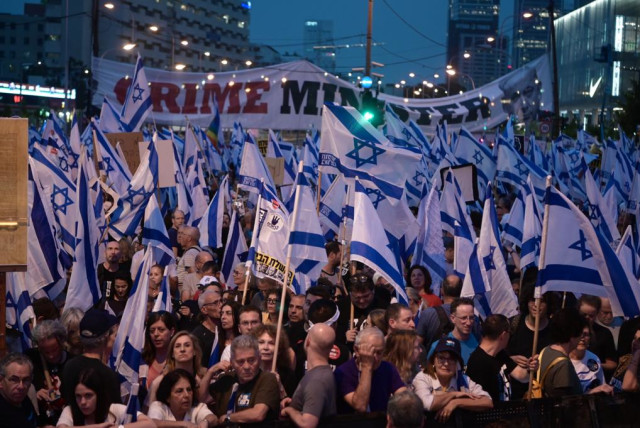My Word: The fires of perpetual protests

In 1999, Barak beat Netanyahu to become prime minister for a little more than one messy year, and he has never forgiven Bibi for coming back to power, again and again.
"We’re here. And we’ll always be here. We’ll never give up. Never,” a friend posted on Facebook on a recent Saturday night. I don’t remember what week it was of the demonstrations against the judicial reform, but we’re now entering week 26. I was tempted to reply “Never say never,” but I didn’t want to be drawn into yet another of those painful social media battles masquerading as dialogue.
At the time, maybe three or four weeks ago, I wanted to know under what circumstances the faithful protester would nonetheless be willing to find another Saturday night activity: If the talks under the auspices of President Isaac Herzog were to result in some kind of compromise, for example, would she still be found holding a banner on Tel Aviv’s Kaplan Street once a week? What about if the reform were significantly rolled back – more than it has already been changed?
On June 14, the coalition suffered a humiliating defeat – somewhat of an own-goal, thanks to firebrand Likud MK Tally Gotliv – when it failed to elect an MK to represent it on the Judicial Selection Committee. Only the opposition’s candidate, MK Karine Elharrar, was selected and the vote for the second Knesset representative on the committee was postponed by a month.
Did opposition leaders Yair Lapid and Benny Gantz celebrate by bringing new energy to the president’s initiative to create a broad consensus? No. They announced they would withdraw from the talks until the Judicial Selection Committee composition had been fully resolved. Any excuse to torpedo the talks – even if it encourages the coalition to advance the legislation unilaterally.
Why do demonstrators say they’ll never stop? Because the protest is not about the judicial reform. It is the continuation of the familiar anti-Bibi protests held by the Black Flags and similar groups against the prime minister during his previous term in office.
Longtime rivals Barak and Netanyahu
The protests could be considered an extension of the ongoing rivalry between Ehud Barak and Benjamin Netanyahu. In 1999, Barak beat Netanyahu to become prime minister for a little more than one messy year, and he has never forgiven Bibi for coming back to power, again and again.
Barak’s longtime confidant, lawyer Gilead Sher, recently revealed in a podcast with Haaretz reporter Amir Oren that a small circle had formed after the November 2022 election to discuss strategy and funding for a movement against the new government. The meeting was hosted by Yossi Kutchik, the director general of the Prime Minister’s Office during Barak’s term in office, and included Sher and former IDF chief of staff Dan Halutz, as well as hi-tech entrepreneur, former fighter pilot, and left-wing political activist Orni Petruschka. The group was reportedly joined by, among others, former deputy attorney-general Dina Zilber and scientist Shikma Bressler, a prominent member of the Black Flags group.
The leaders of the latest incarnation of the “Anyone but Bibi” movement began meeting before the government was formed and before Justice Minister Yariv Levin and Knesset Constitution, Law, and Justice Committee head Simcha Rothman had announced their proposed reform. This is not about the judicial change, this is about the change in government which saw Netanyahu return to power.
It is close to an attempted coup – a concentrated effort, led by former chiefs of staff, Barak, Halutz, and to a lesser extent Moshe (Bogie) Ya’alon, to overturn the results of the democratic election which produced a coalition of 64 MKs.
And anything goes. Protest leaders on Tuesday declared that they will hold another Day of Paralysis next week and plan to disrupt operations at Ben-Gurion Airport – not for the first time. We have already seen so many red lines crossed that the protests have become a blur and the shouts of “Busha” (“Shame”) and “Dem-o-krat-ia” have turned into the soundtrack of 2023.
The protests have been held at home, and they’ve been held abroad – following government ministers where they travel. An Israeli with a megaphone shouted in Rothman’s ear in New York and a protester lunged at Economy and Industry Minister Nir Barkat in a hotel in Boston. Agriculture Minister Avi Dichter was hit on the head by a demonstrator with a flag pole at Airport City. The Jerusalem offices of the Kohelet Forum, the think tank that provided much of the background material for the reform, were vandalized.
On Wednesday, several hundred protesters, members of the Brothers in Arms group, gathered outside Levin’s apartment block in Modi’in, burning tires, blocking roads with barbed wire – and, of course, yelling through megaphones. It started at 5.30 a.m. The demonstrators wearing the group’s by now familiar green T-shirts arrived in hired buses. The protest did not have a police permit. Demonstrations are not allowed at that hour, that close to private homes, and blocking roads. Illegal acts are apparently considered legitimate if you can dress them up under the guise of protecting the judiciary and democracy.
This week, the police said that they would be investigating Barak and a former Meretz lawmaker Maj.-Gen. (ret.) Yair Golan for alleged incitement. At a Saturday night demonstration, Barak urged “revolt” and “nonviolent civil disobedience” and Golan echoed that call in a radio interview.
Some reservists – particularly pilots and members of elite cyber intelligence units – this week again announced that they would not take part in their respective units’ activities.
Just how former chiefs of staff-turned-protest leaders like Barak and Halutz made their money deserves its own inquiry. I remember learning that Halutz had sold his investment portfolio at the outset of the Second Lebanon War, on a day he should have been more concerned with the fate of soldiers than with the state of his personal fortune. And the relationship between Barak and pedophile financier Jeffrey Epstein should make him an unlikely hero in any revolution purporting to promote moral and legal values.
The country is being held hostage. And many of the protesters, however sincere, are being cynically manipulated. The proposed reform and the resulting mass demonstrations have weakened the country socially, financially, diplomatically, and from a security aspect. This is particularly sad given that the talks hosted by the president have shown that there is common ground and room for consensus: There is a need for judicial reform – the argument should be over the degree and pace.
Lately, much-shared posts on social media have proposed a consumer boycott on Tuesdays. The concept is that if no non-essential products or services are purchased, it will result in a drop in millions of shekels in VAT revenue which will harm the government, particularly the prime minister and Finance Minister Bezalel Smotrich.
I suspect that those same people who hold off buying things on Tuesday will make the purchase on Wednesday instead. But that’s not the only failure in logic: Why would you want to harm the economy of the country in the name of protecting it? It reminds me of the people who called on the public to refuse COVID vaccinations in case the vaccination campaign could be seen as a Netanyahu success story.
Other posts have called for the public to pay for purchases in cash only and to withhold tax payments – again (illegally) harming the tax revenue.
We have already seen hi-tech companies and businesses threaten to relocate abroad – and then complain that the economy is suffering.
In the same way the protests didn’t start with the launch of the judicial reform, they clearly won’t end with it either. The demonstrations can be seen as a celebration of democracy but they also set a dangerous precedent: No future government – Left or Right – will be able to pass legislation and execute their policies if they are faced with the specter of mass demonstrations, threats to take financial assets out of the country, having the IDF brought into political battles, and the closure of the international airport.
My colleague Herb Keinon this week wrote: “The question is not ‘who started the fire’ but rather who will have the courage to put it out.” I’d add to that the question: “How to put it out?” The answer is blowing in the wind along with the smoke and the mass of blue-and-white flags.
As for the perpetual Saturday night demonstrator on Kaplan Street who claims that nothing will ever stop her, I can only say, in Shakespeare’s immortal words: “The lady doth protest too much.”
liat@jpost.com
Jerusalem Post Store
`; document.getElementById("linkPremium").innerHTML = cont; var divWithLink = document.getElementById("premium-link"); if (divWithLink !== null && divWithLink !== 'undefined') { divWithLink.style.border = "solid 1px #cb0f3e"; divWithLink.style.textAlign = "center"; divWithLink.style.marginBottom = "15px"; divWithLink.style.marginTop = "15px"; divWithLink.style.width = "100%"; divWithLink.style.backgroundColor = "#122952"; divWithLink.style.color = "#ffffff"; divWithLink.style.lineHeight = "1.5"; } } (function (v, i) { });

